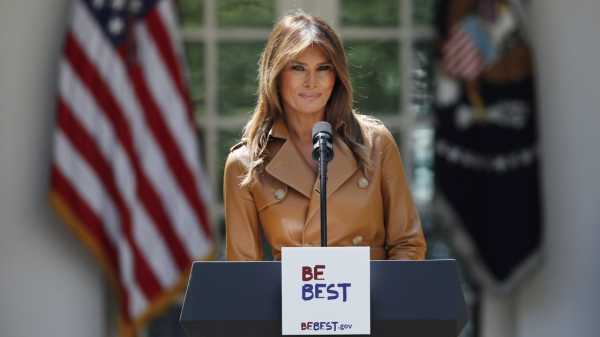
There are two main paths for book or movie reviews: describing what the object of criticism is like, and evaluating whether it is good or bad. These diverging orientations can apply more generally. President Trump, for instance, is drawn to the second type of judgment. His speeches on foreign policy or health care or education are thus interchangeable, clotted with “beautiful,” “great,” “tremendous,” or else “terrible,” “sad,” “unfair.” Who is Theresa May? How to talk about the relief effort after Houston flooded in 2017? A wonderful woman; a wonderful thing.
I thought of this tic of the President’s on Monday when Melania Trump unveiled, sixteen months into her term as First Lady, her official agenda: an initiative called Be Best. The campaign focusses on the “social, emotional, and physical health” of children, with three pillars: well-being, social media, and opioid abuse. It is unclear how “well-being” will be defined in this context. (“As First Lady of the United States, I will make every effort to be best at championing the many successful well-being programs in existence today,” Melania said at the ceremony.) The exact connection between social media and opioid abuse is also hazy. In a yet more bewildering juxtaposition, we are asked to regard Melania Trump, the wife of @realDonaldTrump, as an enemy of cyberbullying. Melania Trump—the wife of the man who just asked Congress to siphon seven billion dollars away from children’s health care, who champions policies that tear immigrant children away from their families—intends to fight for kids. She will do this with inspirational rhetoric, as well as material plagiarized from the previous Administration: the White House Web site reproduced an Obama-era booklet on teen-agers and the Internet with an updated byline (“by Melania Trump and the Federal Trade Commission”) but with the same pagination errors. Even the motto is a playground attempt to one-up “Be better,” the catchphrase that Michelle Obama delivered to a rapturous live audience during an interview with Oprah Winfrey.
“Be best” at what? The First Lady’s spokeswoman, Stephanie Grisham, casts the blurriness of the Be Best campaign as a strength, “something unique.” “She has not narrowed her platform down to just one topic as has been done in the past,” Grisham said, on CNN. “Mrs. Trump wishes to help the next generation by creating change through awareness on a variety of issues.” Be best: Is it a competitive challenge to kids? (Yikes!) A benediction? A Yoda-esque mantra? It has a Trumpian tinge, a view of life as a competition divided into winners and losers. But the grammar crumbles around itself; here is a motto for careerist doges. Its vacuity accords with the Trump Administration’s general nihilism: the President fixates on rankings because he can grasp little else.
Donald Trump’s emptiness revealed itself over decades in the media glare. But Melania, a former model, has long embraced vacancy as an aesthetic. She has the creepy, objectified opacity of a doll, or a robot—a shimmer of the uncanny valley. Her willed passivity may be the strongest expression of her agency. She is an avatar of blankness, a mute queen. Standing behind a podium in the Rose Garden, her husband in the audience, Melania spoke slowly, with practiced inflections; she sounded like an actor reading from a script that she didn’t quite understand. When the words “Be Best” materialized on a screen above her head, their wobbly font and off-key grammar produced a sense of dissociation, as though we were all kids wondering where our parents had gone.
Maybe Melania wondered, too. On Monday, her reticence felt childlike, because of her high and girlish voice, because of the silly pie-in-the-sky broadness of her initiative and its garbled linguistics. (“Be best!” is something a three-year-old might squawk at her toy.) It was almost as if Melania, in speaking out on behalf of American kids, was really advocating for herself. A canny adult might take a stand against Internet negativity in order to troll her husband; such a gesture seems beyond the First Lady’s powers. It is easier to imagine her as the shy, pretty child on the playground, waiting around for someone to make the big bully stop.
Sourse: newyorker.com






